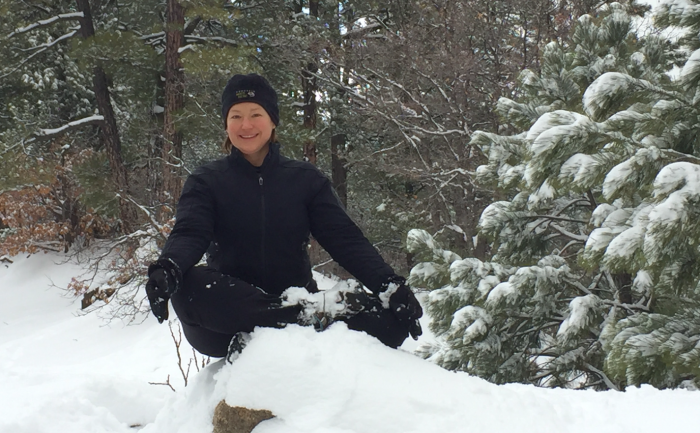As I was trying my hand one more time at frying tofu this morning, I finally figured it out.
I had an aha moment about myself.
It’s my day off and I wobble between trying to plan things and lazing from one serendipitous adventure to the next.
Today’s pretty typical: I scheduled in meditation, yoga class, and education, and then I spent the morning writing, hanging with my partner in life, and learning a new recipe. I’ve done zero of the planned things so far. #Winning!
The dichotomy made me laugh.
Part of what I do for others is help them imagine and inhabit supportive routines and here I am still structuring my time as if I went to work doing something totally different. I’m still thinking like a paramedic who has to get ready for 13 to 15-hour days and recover quickly for the turnaround.
In reality, six years ago, I left that career I loved for the one I love now: helping people create and practice healing routines based on yoga and science.
I realized that I’m still inhabiting the buckets of my mind that were helpful when my work happened in a high-stress environment with little predictability inside a pretty rigid structure: 20 minutes for tea and reading, 30 minutes for asana, 20 minutes for meditation, 20 minutes to eat and food prep for the day, 20 minutes to shower and get ready, 12 minutes to get to work.
At work, I had 15 seconds to hit “en route” when a call comes through and four minutes to arrive on some calls, 10 on others. A paramedic has 15 minutes to get off the scene and 15 minutes to drop at the hospital before going back into service. When you stop bagging (“bagging” the patient is regularly necessary for medical emergencies when the patient’s breathing is insufficient or has ceased completely), you have 120 seconds to complete intubation and be bagging again. You deliver 10 breaths a minute if fending off brain swelling.
The numbers change with research and systems, but the idea is the same: you live (by numbers) in a world where you are always ready for what no one expects.
In between, you may have to put someone on the cardiac monitor, start an intravenous line, drop medication, fend off a punch, slough vomit or rain, thump chest, or change plans. You may be in traffic or in someone’s living room. Your patient may lose or regain consciousness, or the rig goes over a bump sending you three inches into the air for a moment—no biggie.
You may hold someone’s hand, call for an extended scene time to help a hospice patient transition, or furiously make a call to social services. You may be delayed on the scene because there’s a 125 pound Rottweiler charging the door over the unconscious person right inside the door.
These are all aspects of the job I loved. I would’ve been lost with a more routine job or one that kept me indoors. And now my variety and spontaneity are provided by longer and “sustained over time” human interactions more than circumstance.
I know the times I begin and end, where I practice, and plan breaks accordingly. If I don’t have time to eat, it’s because there’s something in the schedule I need to change.
If I need to go to the bathroom, I go. I work with people who make big changes over time. There are no real emergencies and when we feel time pressure, it’s my job to disarm it, not beat it.
Right now, I can hardly imagine how my mornings, days, and downtime can change. I’m sitting with the realization that more than six years after leaving the field (almost exactly five years since my license lapsed), I’m still living out the shape and rhythm of that job.
I’m still scheduling my morning like I’m driving to the ambulance farm and riding in the rig all day. I’m still using my days off like they’re my lifeline of decompression in a world that requires a crazy focus.
As much as I loved my old job as a paramedic and as much as I love what I do now, it is what I do for service and how I make a living in the world—not who I am.
Right now, I’m sitting with a new layer of realizing that.
Time is one of the ways we organize our being into roles and compartments. But time is also something that seeps from us. There is no time without consciousness. There is no time without change, action, and transformation. We are, in the words of Kaz Tanahashi, “time beings.”
How have I allowed my life to seep into the buckets I’ve made for that job for so long?
How did I not notice that the same old buckets didn’t fit the way time was flowing through me in my new way of serving?
How do I do this for others and not see it for myself? More importantly, how can I soften with this realization and allow my life to express it?
This answer will require living with these questions, and I’ll report back about how I change.
What structures do you find yourself using that have outlived their usefulness? What do you do now because it worked then?
I’ll be right here, sitting, sitting, being, being.
And eventually, writing.
~











Read 0 comments and reply